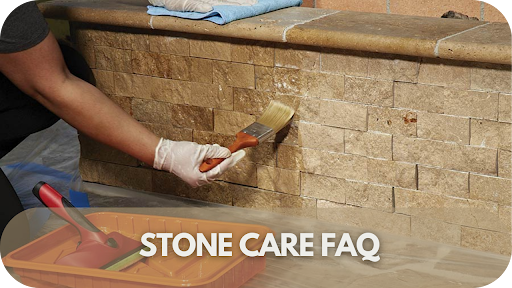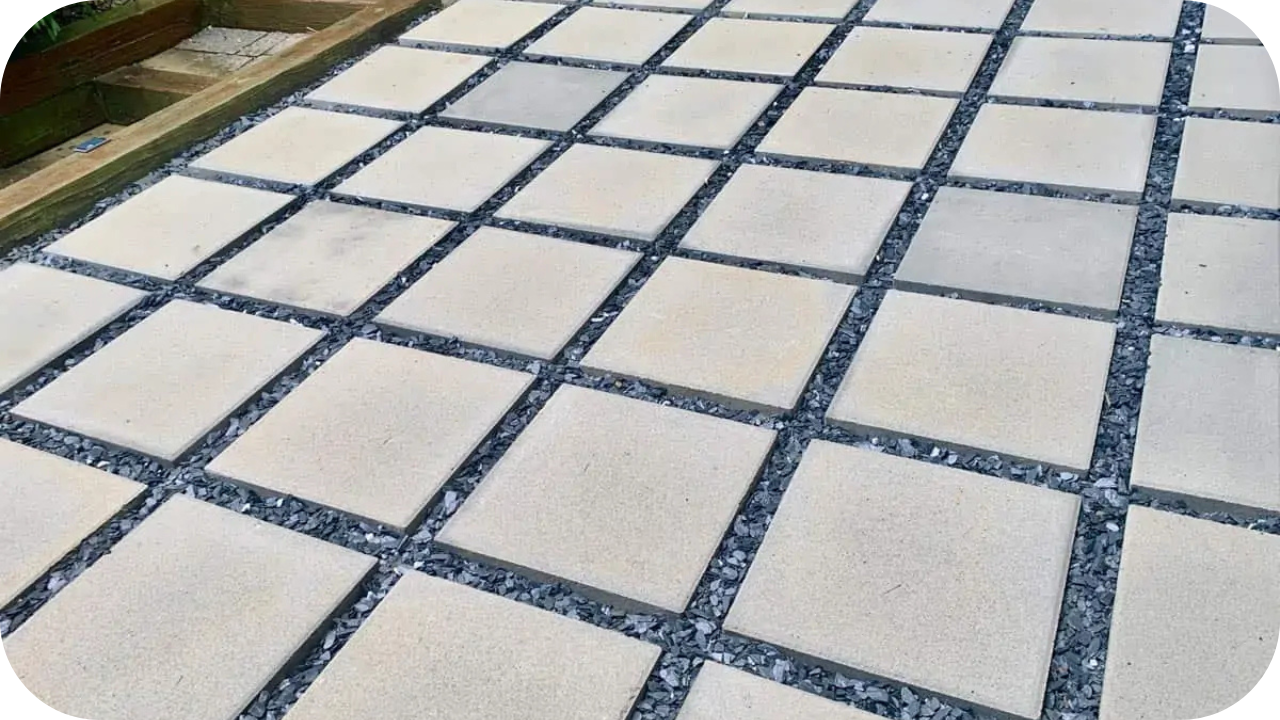
Natural stone brings timeless beauty and sophistication to any space, but it requires the proper care to maintain its allure.
From marble to granite, each type of stone has unique needs that, when overlooked, can lead to damage over time. But don’t worry — we’ve got you covered.
In this guide, we’ll answer your most common stone care questions and provide expert tips to keep your stone looking pristine for years to come. Ready to protect your investment? Let’s get started!
1. What is the Best Way to Clean Natural Stone?
When cleaning natural stone, it’s essential to use a mild, pH-neutral cleaner to avoid damaging the surface.
Avoid using harsh chemicals or abrasive scrubbing pads, as these can scratch or etch the stone. For everyday cleaning, simply use a soft cloth or mop with warm water and a stone-safe cleaner. Deep cleaning should be done periodically to remove built-up dirt and grime, especially in high-traffic areas.
Always blot, rather than rub spills immediately to prevent liquids from soaking into porous stones. Regular, gentle cleaning will help maintain the beauty and longevity of your stone surfaces.
2. How Often Should I Seal My Natural Stone?
Sealing natural stone is crucial to prevent staining and moisture penetration. The frequency of resealing depends on the type of stone and how much it’s used.
Granite typically needs resealing every 1 to 3 years, as it is relatively less porous. More porous stones like marble or limestone may need resealing every 6 to 12 months.
A key sign that it’s time to reseal is when water no longer beads on the surface or the stone begins absorbing liquids more quickly. Regular resealing helps maintain the stone’s protection and keeps it looking its best for longer.
3. How Can I Prevent Stains on Natural Stone?
Stains on natural stone, such as oil, water, and acidic stains, can be prevented with some simple care. Always wipe up spills as soon as they occur, especially on porous stones like marble and limestone, which are more prone to staining.
Using coasters, trivets, and cutting boards can help protect the stone from everyday oils and liquids. If a stain does occur, blot the area with a clean cloth and avoid scrubbing, which can worsen the stain. For persistent stains, consider using a stone-safe poultice or seeking professional cleaning if necessary.
4. Can I Use Natural Stone in Outdoor Areas?
Natural stone can certainly be used in outdoor areas, but its durability in different weather conditions depends on the type of stone.
Harder stones like granite and sandstone are highly resistant to the elements and make great choices for outdoor paving, patios, and facades. Softer stones, such as marble, can be affected by rain, frost, or extreme heat, so they are better suited for sheltered areas.
Regular sealing helps protect outdoor stone from moisture, while pressure washing can remove dirt and grime from stone surfaces. Always choose the right type of stone for the specific outdoor environment to ensure longevity.
5. What Should I Do if My Stone Gets Scratched or Chipped?
For minor scratches, a polishing compound designed for that type of stone can often restore the appearance of your natural stone.
Buff the scratched area gently with a soft cloth and the compound, taking care not to cause further damage. The process is a bit more involved for chips or cracks. Clean the area thoroughly before applying a stone resin or epoxy designed for repair.
Follow the manufacturer’s instructions and allow the product to cure fully. In cases of significant damage, it’s best to consult a professional restoration expert to ensure the repair blends seamlessly with the rest of the surface.
6. How Do I Prevent Weeds or Moss from Growing on My Stone?
Weeds and moss thrive on stone surfaces in damp, shaded areas, often on patios, walkways, and other outdoor spaces.
To prevent growth, regularly clean the stone and apply a stone-safe sealant that helps protect against moisture penetration. This barrier reduces the likelihood of moss and weeds taking root. If you notice existing growth, use a soft-bristled brush and a mild soap-and-water solution to scrub it off.
Avoid using harsh chemicals that could damage the stone’s surface. Regular cleaning and proper sealing will help keep your stone surfaces free from unwanted growth.
7. Can I Use Stone in High-Traffic Areas?
Natural stone can be used in high-traffic areas, but some stones are more suitable than others for these demanding environments.
Stones like granite and quartzite are durable, resistant to scratching, and well-suited to high-traffic areas like kitchens, hallways, and commercial spaces. Softer stones such as marble or limestone, while beautiful, are more prone to scratches and wear, and may not hold up as well under heavy foot traffic.
Regular cleaning is essential to maintain stone surfaces in high-traffic areas, as is resealing to protect against wear and staining. Using rugs or mats in high-traffic spots can also help minimise damage.
8. How Do I Protect Stone Surfaces from Heat Damage?
Different types of natural stone offer varying levels of heat resistance, with granite and quartz being particularly heat-resistant, making them ideal for kitchen countertops and other high-heat areas.
Marble is more sensitive to heat and can be prone to scorch marks or discolouration. To protect your stone from heat damage, always use trivets, hot pads, or coasters when placing hot pots, pans, or cookware on the surface.
If heat damage occurs, such as scorch marks or discolouration, polishing compounds may be used to restore the surface. For more significant damage, consider consulting a stone restoration professional.
9. Are There Any Special Care Requirements for Marble?
Marble is a beautiful but more delicate natural stone that requires special care. Its porous nature makes it susceptible to staining, scratching, and especially etching from acidic substances like lemon juice, vinegar, or wine.
Always use a pH-neutral cleaner to care for marble and avoid harsh chemicals. Regular sealing is essential to protect the stone from moisture and stains.
For everyday maintenance, clean spills immediately and use coasters or placemats to prevent oils and acidic substances from contacting the surface. When properly cared for, marble can maintain its beauty and shine for years.
10. How Do I Remove Hard Water Stains from Stone?
Hard water stains on stone surfaces can appear as white, cloudy marks, often seen in bathrooms or kitchens where water frequently pools on the stone.
To remove these stains, mix a water solution and mild dish soap or use a stone-specific cleaner. Apply the solution to the stained area and gently scrub with a soft cloth. For stubborn stains, you may need a poultice, a paste made of baking soda and water, which can help draw out the mineral deposits.
To prevent future stains, wipe down the stone after exposure to water and consider applying a protective sealant to reduce mineral buildup.
11. Can I Use Stone for Shower Walls and Floors?
Natural stone can be used for shower walls and floors, but not all types are equally suitable for wet environments.
Granite, Travertine, and certain types of quartzite are excellent choices for showers, as they are naturally water-resistant and durable. Conversely, Marble is more porous and prone to staining or etching from moisture, so it requires extra care and regular sealing.
Always choose a moisture-resistant stone for showers and bathrooms and seal it regularly to protect it from water damage. Regular cleaning and maintenance will also help preserve the beauty of your stone shower surfaces.
12. How Can I Enhance the Appearance of My Stone Surfaces?
Regular maintenance and the right finishes are key to enhancing the appearance of stone surfaces. Polishing can bring out your stone’s natural colour and shine, making it look more vibrant and fresh.
Depending on the stone type, you may also choose from different finishes such as honed, brushed, or polished to achieve the desired look. Regular cleaning, resealing, and protection from stains will help maintain the surface’s pristine appearance over time.
If your stone has lost its lustre, consider professional restoration services to restore its original shine and smoothness.
Conclusion
Caring for your natural stone ensures its beauty and longevity, making it a lasting investment in your home or project.
By following the tips and advice shared in this guide, you’ll keep your stone surfaces looking pristine for years to come. Remember, regular maintenance and the right products are essential.
If you need further advice or expert help with your stone care, don’t hesitate to contact Splendour in Stone — we’re here to assist!
More To Explore

Top Outdoor Paving Ideas for Aussie Backyards
Are you ready to transform your Aussie backyard with stunning paving ideas? Whether you’re looking to create a stylish outdoor entertaining area, a functional pathway,

Small Backyard? Here’s How to Maximise with Stone
Struggling to make the most of your small backyard space? Many homeowners with limited outdoor areas feel restricted when it comes to design. But what


